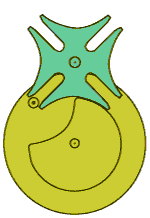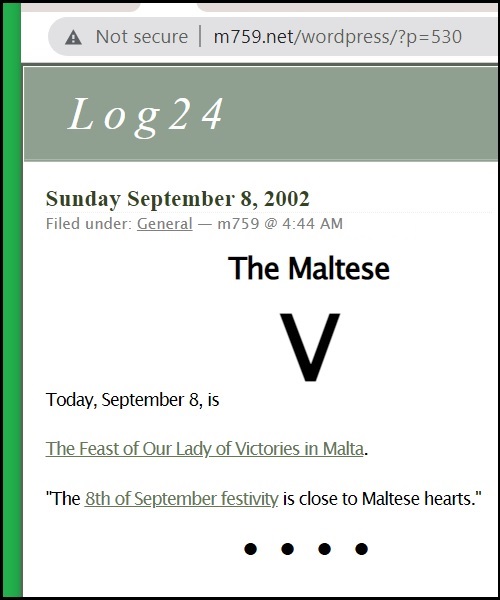Friday, June 6, 2025
Monday, September 26, 2022
Thursday, September 8, 2022
Analogy in Mathematics: Chevron Variations
André Weil in 1940 on analogy in mathematics —
| . "Once it is possible to translate any particular proof from one theory to another, then the analogy has ceased to be productive for this purpose; it would cease to be at all productive if at one point we had a meaningful and natural way of deriving both theories from a single one. In this sense, around 1820, mathematicians (Gauss, Abel, Galois, Jacobi) permitted themselves, with anguish and delight, to be guided by the analogy between the division of the circle (Gauss’s problem) and the division of elliptic functions. Today, we can easily show that both problems have a place in the theory of abelian equations; we have the theory (I am speaking of a purely algebraic theory, so it is not a matter of number theory in this case) of abelian extensions. Gone is the analogy: gone are the two theories, their conflicts and their delicious reciprocal reflections, their furtive caresses, their inexplicable quarrels; alas, all is just one theory, whose majestic beauty can no longer excite us. Nothing is more fecund than these slightly adulterous relationships; nothing gives greater pleasure to the connoisseur, whether he participates in it, or even if he is an historian contemplating it retrospectively, accompanied, nevertheless, by a touch of melancholy. The pleasure comes from the illusion and the far from clear meaning; once the illusion is dissipated, and knowledge obtained, one becomes indifferent at the same time; at least in the Gitâ there is a slew of prayers (slokas) on the subject, each one more final than the previous ones." |
"The pleasure comes from the illusion" . . .
Exercise:
Compare and contrast the following structure with the three
"bricks" of the R. T. Curtis Miracle Octad Generator (MOG).

Note that the 4-row-2-column "brick" at left is quite
different from the other two bricks, which together
show chevron variations within a Galois tesseract —

Wednesday, September 11, 2002
Wednesday September 11, 2002
Double Cross
From the New York Times obituaries of 9/11, 2002:
"Henri Rol-Tanguy, one of France's most decorated Resistance heroes, who organized the popular uprising against the German occupation of Paris… died Sunday [Sept. 8, 2002]. He was 94."
Sunday was V-day in Malta. See my log24.net notes below:
The Maltese Cross,
The Maltese V,
A Birthday Song, and
The Boys from Uruguay.
For another sort of victory, see my log24.net note of August 24,
Cruciatus in Crucem.
The Cruciatus note describes what might be called the "Red" cross, or Croix de Guerre. The Maltese Cross note describes a cross more properly associated with intelligence than with courage. (Both qualities are, of course, needed… courage and a brain, as well as a heart.) More from the Rol-Tanguy obituary:
"From 1964 to 1987, he was a member of the central committee of the French Communist Party… Mr. Rol-Tanguy received most of France's medals of valor, including the Croix de Guerre and the Grand-Croix de la Légion de l'Honneur."
The following quotations are not without relevance.
There is never any ending to Paris and the memory of each person who has lived in it differs from that of any other. We always returned to it no matter who we were or how it was changed or with what difficulties, or ease, it could be reached. Paris was always worth it and you received return for whatever you brought to it. But this is how Paris was in the early days when we were very poor and very happy.
We'll always have Paris.

Here's looking at you, kid.
Sunday, September 8, 2002
Sunday September 8, 2002
The Maltese Cross
In my journal note for Rosh Hashanah (The Boys from Uruguay, Sept. 7) below, I noted that the cross as a symbol of intelligence may be offensive to some readers.
Such readers may contemplate the Maltese cross shown on page 150 of The New Yorker magazine of March 21, 1994, in an article by Nichoison Baker, "The Projector." On page 152 is an explanation of how the cross functions within a motion picture projector, and a statement that "Without this little thing, there'd be no film industry!"
Development of the Web since 1994 allows us to view the Maltese cross in action at the excellent site
The following diagram is from that site:

© Cabaret Mechanical Theatre 1996-01
Sunday September 8, 2002
The Maltese
V
Today, September 8, is
The Feast of Our Lady of Victories in Malta.
"The 8th of September festivity is close to Maltese hearts."
"The 8th September is a special public holiday because it commemorates in fact three events. It is the religious feast celebrating the birth of the Holy Virgin, Maria Bambina; it is the day on which the Great Siege of 1565 ended; and it also the day on which the Italian navy capitulated to the British at the beginning of the end of the Second World War.
But is it best known as victory day, il-Vitorja, in commemoration of the events of 1565 when the Knights of St John and the Maltese Islanders defeated the Ottoman Turks and helped rid Christendom of the Saracen threat.
The feast is celebrated in the villages and towns of Senglea, Naxxar, Mellieha and Xaghra on Gozo."
From Malta's Importance in History:
"Malta managed to keep the enemy at bay, and was awarded the George Cross for it in 1942. Churchill, Roosevelt, Eisenhower and other leaders visited Malta during this time. Malta was called 'the under-belly of Europe,' and her insidious disruption of the Kesserling-Rommel axis who tried hard, and very nearly successfully, to starve the native population and render all military operations impossible through the lack of food and fuel. The lifting of the siege coincided with the Feast of our Lady of Victory: 'il-Vitorja', the 'national' feast."
"From about three days before September 8, ground fireworks, Maltese 'giggifogu' (derived from Italian 'guochi di fuoco'), start to light up the Mellieha Parish Square, with amazing effects. The principal show of ground fireworks is held on September 7, a show which ends at about 12.00am.

Fireworks over Mellieha
The D-Day finally arrives. Early in the morning of September 8, many people attend the sermon in honor of Our Lady of Victories."
Today's feast is known to Roman Catholics as The Feast of the Nativity of Our Lady.
See also the novel by Thomas Pynchon, V.



